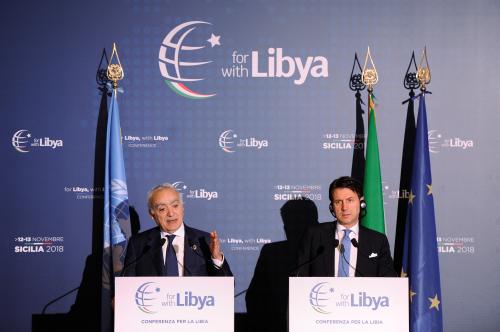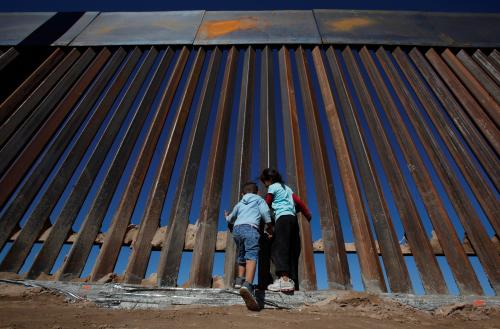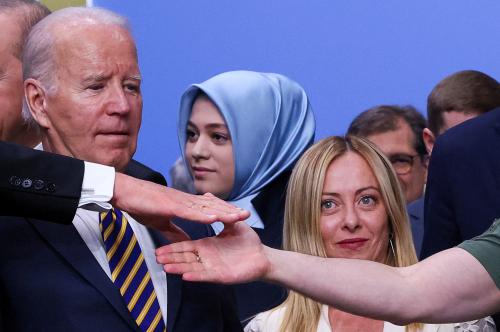From the Mediterranean to the Atlantic, immigration is a divisive topic that has uncovered strong social and political tensions.
While President Trump partially shuts down the federal government over his desire to build a wall with Mexico, Italy closes its ports to the German and Dutch NGOs Sea Watch and Sea Eye, which are transporting 49 migrants that have been rescued off the coast of Libya.
The ships were at sea for almost 19 days, during which Italy and Malta engaged in a heated dispute about which country should take the migrants, fueling once again the debate on modification of the Dublin regulation and on European solidarity.
As their sanitary and health conditions worsen, the migrants on Sea Watch and Sea Eye were finally rescued by Malta’s military personnel and will be distributed between eight EU member states in the next few days. Similarly to what happened with the ships Diciotti, Aquarius, and others last year, this latest case has provoked a great amount of criticism toward the current Italian government, from both the domestic and European arenas.
While the fight against illegal immigration was the hallmark of the League’s 2018 electoral campaign, the implementation of stricter policies has created tensions with its governing partner, the 5 Star Movement. At the same time, the narrative against immigration continues to fuel the rise of Eurosceptic and extreme-right parties that seek to gain momentum in the upcoming European Parliament elections in May 2019.
A government at risk? Tensions between the League and 5 Star Movement
In the political power struggle between these two parties, immigration has become a propaganda tool. While 5 Star focuses on the lack of EU solidarity on this issue, the League pursues a narrative of “Italians first,” adapting the slogan of President Donald Trump.
When the two NGO ships were still floating off the coasts of Malta, 5 Star Leader Luigi Di Maio demanded that Italy “teach the EU a lesson” and allow women and children to disembark. Yet, Salvini immediately asserted his power as minister of interior, rejected Di Maio’s call, and re-confirmed Italy’s “closed ports” policy.
Here, it is worth recalling that while the struggle to end illegal immigration was the central issue for League leader Matteo Salvini’s electoral campaign, the 5 Star electorate was much more divided on this issue and was more sensitive to issues such as minimum income or direct democracy. Therefore, it is not surprising that some members of 5 Star Movement (five senators to be precise) abstained from voting on the “security decree” sponsored by Salvini. In limiting the guarantees offered by the humanitarian protection, in their opinion this decree openly violates the fundamental principles of the Italian constitution.
The limelight afforded to Salvini by his political activity on social media and frequent trips around Italy and beyond attests to what amounts to an ongoing political campaign, with noticeable results. Since last March, the League appears to have jumped from 17.4-percent support in the polls to 31 percent, while 5 Star has lost around 5 percent over the same period.
Yet such disagreements do not seem to be enough for 5 Star to pull the plug on the coalition. Recent polls show that 5 Star does not have enough support to govern alone and does not want to lose the chance to implement its program on social policies and direct democracy. The League’s position is more ambiguous. While it might take advantage of governing with 5 Star and blame them for any possible future failure of the government’s activity, Salvini’s political and communication savvy might increase the League’s base of support and revitalize the center-right to pursue policies that 5 Star would oppose.
What does this mean for Europe?
In the last five years, the number of people immigrating to the EU has dropped by 80 percent—and yet, the anti-immigration narrative remains strong. There is no longer an emergency, yet this is a propaganda tool used by anti-immigration parties to gain more power by exploiting people’s fears. The League in Italy, the National Front and (some) of the Yellow Vest movement in France, the Alternative for Germany, Viktor Orbán’s Fidesz in Hungary, and the Freedom Party of Austria are only a few examples.
The episodes with NGO rescue ships show how Europe has fallen in the trap of addressing global challenges with more sovereignty and less solidarity. This shift will inevitably be reflected in the upcoming European elections, in which sovereigntist and anti-immigration forces are expected to gain a fair amount of seats in the EU parliament.
For now, the last-minute deal between the eight states accepting to receive a quota of immigrants—along with today’s meeting between the Italian Prime Minister Giuseppe Conte and the EU commissioner Dimitris Avramopoulos—contained the emergency for Sea Watch and Sea Eye. Nevertheless, if the EU does not concretely show what it stands for in terms of respect of human rights and inter-state solidarity, it is likely that populist and eurosceptic parties will continue to leverage the immigration issue, among others, to destroy what transformed the EU from an economic community to a community of shared values.
The Brookings Institution is committed to quality, independence, and impact.
We are supported by a diverse array of funders. In line with our values and policies, each Brookings publication represents the sole views of its author(s).







Commentary
Italy and immigration: Europe’s Achilles’ heel
January 14, 2019